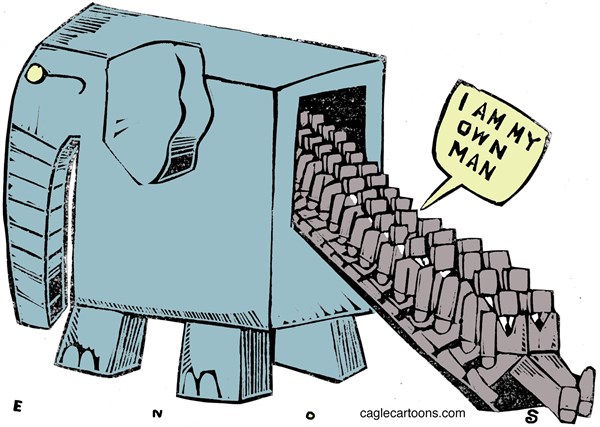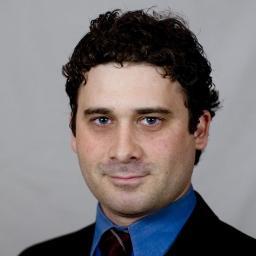
Ahead of his speech Wednesday at the Chicago Council on Global Affairs, Bush's aides released the list of experts whose careers span the administrations of Ronald Reagan, George H.W. Bush and George W. Bush. Meanwhile, in his speech, he pitched himself as aligning with none of those past presidents: "I am my own man."
Among many Washington Republicans, Bush's showcasing of his adviser list was seen as a brazen attempt to present the image of a front-runner and even a veneer of invincibility. Several Republican foreign policy veterans bristled at what they saw as the campaign's effort to pressure top experts to commit to him before the primary campaign has even started and before other prospective candidates have been able to make their cases.
"I've certainly heard that view expressed," said former Romney adviser and under secretary of defense for policy Eric Edelman, referring to the angst in GOP foreign policy circles about Bush's tactics. "It's not a good thing for any campaign to project an air of entitlement."
"The shock and awe Jeb has attempted on the fundraising side now extends to the policy side, where they are trying to lock down support," said a Republican who advised Mitt Romney on foreign policy in 2012 and who has not yet committed for 2016. "They want monogamy. But not everybody they approached said yes."
Top aides to Bush, including former Wal-Mart chief executive officer Bill Simon, have been meeting with a host of Republican ex-officials, think-tank scholars and political operatives to ask them to sign on now. The pressure is implicit, because those who decline risk being cut out of the inner circle as the campaign moves forward.
But there's a real down side for Bush in naming so many brain-trust members so early, several GOP former officials told me. For one thing, by listing several people who fundamentally disagree on major issues, Bush may be setting up a team that is perpetually in conflict. For example, Robert Zoellick, the former U.S. trade representative, and Paul Wolfowitz, the former deputy secretary of defense, are unlikely to see eye to eye on much. Potential voters could also be confused by a team that has no clear ideological identity, especially one advising a candidate who has little to no foreign policy experience.
Still, said Edelman, Bush may benefit ultimately by including people from across the Republican foreign policy spectrum. And top advisers who served in both previous Bush administrations could provide a bridge between the realists and the neoconservatives.
Another potential problem for Bush is that by making his team public now, their comments and actions become attributed to the campaign, whether the candidate agrees or not. For example, former Secretary of State James Baker came under criticism when it was announced he will be a keynote speaker at the conference for J Street, an Israel-related nongovernmental group that many Republicans criticize. "There's a case to be made for staying below the radar," one top GOP political operative said. "You're creating a whole host of targets for the media and your opponents to dig into."
Similarly, Bush has already been criticized for taking on advisers who had a role in the 2003 Iraq invasion. In his speech, Bush said that mistakes were made during the Iraq war but that his brother's decision to surge troops there in 2007 was "one of the most historic acts of courage politically" he had ever seen. He criticized President Barack Obama's decision to withdraw all troops in 2011.
There's an understanding in the GOP foreign policy community that Bush's foreign policy team is not necessarily a reflection of his views on national security issues and that he will likely have to run a campaign on foreign policy that balances between the need to stay to the hawkish side of Hillary Clinton and the recognition that going too far to the right could alienate voters in a general election.
As a former governor, Bush cannot run on his foreign policy credentials, so he is expected to follow the basic path that Romney used successfully to cut his national security deficit with Obama in 2012. He will criticize Obama's policies as failures, promote a stronger and more assertive American foreign policy, and avoid outlining specific remedies for complicated problems as much as possible.
"America does not have the luxury of withdrawing from the world," Bush said Wednesday, sounding a lot like Romney in 2012. "We have no reason to apologize for our leadership … nothing and no one can replace strong American leadership."
In the end, campaign foreign policy teams tend to be used sparingly anyway. Candidates usually rely on a few select confidants to write their speeches and their talking points. Scores of foreign policy "advisers" spend most of the campaign arguing among themselves and writing policy papers that never get read.
But the tradition in Washington, especially in the Republican Party, is that foreign policy heavyweights wait until late in the campaign to choose a candidate. By leaning early on many people who owe their careers to his father or his brother, Bush is breaking that tradition. Now that he has taken on so many advisers, he could struggle to uphold his pledge to be his own man.
Josh Rogin
Bloomberg News
(TNS)
Comment by clicking here.
Josh Rogin, a Bloomberg View columnist, writes about national security and foreign affairs. He has previously worked for the Daily Beast, Newsweek, Foreign Policy magazine, the Washington Post, Congressional Quarterly and Asahi Shimbun.
Previously:
• 01/22/15: At GOP pow-wow 2016 front-runners pledge, lay out vision to restore America's world leadership role


 Contact The Editor
Contact The Editor
 Articles By This Author
Articles By This Author
